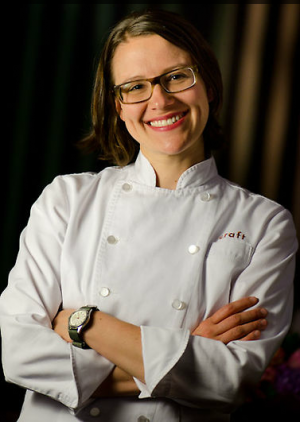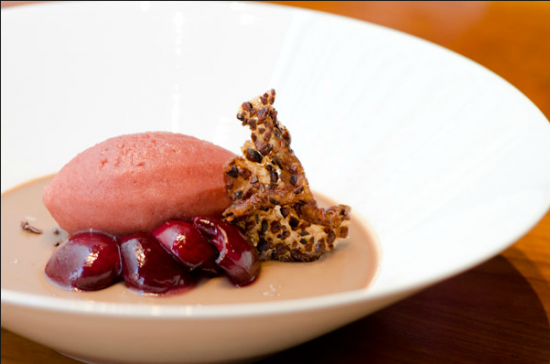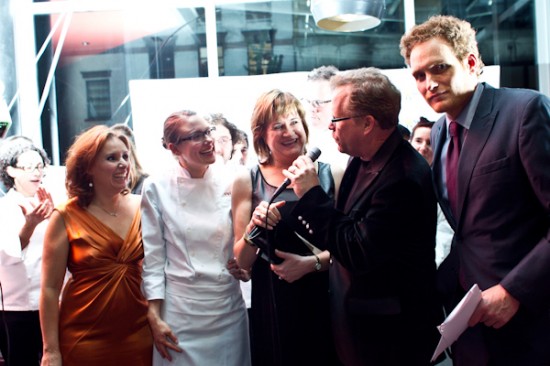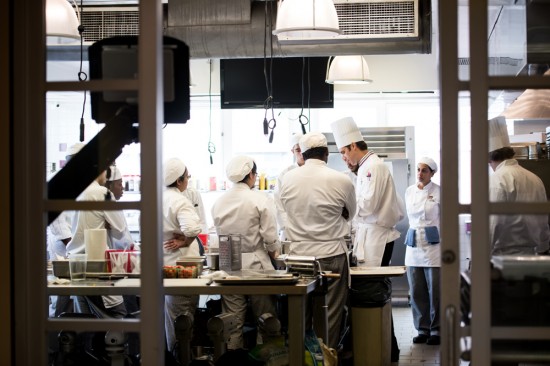I distinctly remember the first time I tried to establish a relationship with a pastry chef that I really admired. I was a 17-year-old pastry cook in Chicago at Gordon. It was my first restaurant kitchen position, and I was lucky to be given the advice to spend my days off staging (aka, working for free) for other chefs to gain more experience.
 I had just eaten at Trio in Evanston where Della Gossett was the pastry chef. Her dessert menu blew me away, and I knew I had to meet her. I called her kitchen and asked if I could spend a week working with her. She agreed.
I had just eaten at Trio in Evanston where Della Gossett was the pastry chef. Her dessert menu blew me away, and I knew I had to meet her. I called her kitchen and asked if I could spend a week working with her. She agreed.
After a week of making simple recipes and helping with basic prep work, I thought Della and I were two peas in a pod. So about a week after my stage, I decided to call Della, IN THE MIDDLE OF DINNER SERVICE, to ask what her thoughts were about the best flavor pairings to use with pomegranate. Not to mention, it was July, and I was busy making a list of ideas for the fall and winter season.
I still cringe at Della’s response: “Ummm…pomegranate is out of season. Why are you calling me right now?” Of course, I was just a silly pastry cook who forgot that a pastry chef might be a bit too busy to entertain my creative whims. Don’t get me wrong; Della was perfectly civilized in her response—not rude at all—which was quite generous of her.
But I quickly learned that bothering a chef in the middle of dinner service is not a professional way to build a friendship with a new mentor. To make matters worse, I wasn’t in any way responsible for creating menu items at Gordon, so what the heck was I doing making a list of dessert ideas anyway? It’s funny how certain memories stick with you, right?

So how does one go about creating meaningful relationships with mentors? Here are five tips:
Be curious.
Start by observing what successful chefs around you are doing differently—maybe it’s a new flavor combination, maybe it’s a new cooking technique or maybe it’s sourcing from an interesting producer—whatever it is, use that as an entry into conversation with that chef.
How do you start that conversation? Don’t call them! Instead, write an email and ask if you can stage in their kitchen. Otherwise, you can go to dinner at their restaurant and ask to tour the kitchen afterwards. Tell your server you are a culinary student or a cook and use flattery and compliments to get through the door. Everyone loves being told they are great—especially when the comments you are making show your intelligence and passion.
Keep in touch.
Whenever you have a chance to interact with a would-be mentor, send personal thank you notes or emails. Once you have worked with that chef, if you see them mentioned in an article, write to them and tell them how much you enjoyed reading that piece.
If you see said chef is cooking for a charitable event, offer to volunteer. If he or she wins an award, send them a card. In many ways, creating a relationship with a future mentor isn’t that much different than making a new friend. Find out what you have in common and build a relationship based on those interests.

Remember that any relationship is a two-way street.
Two of my greatest mentors are Karen Page and Andrew Dornenburg, authors of The Flavor Bible and many, many other brilliant books on food and wine. (If you don’t already have The Flavor Bible and The Vegetarian Flavor Bible, stop reading this post and immediately go to your nearest bookstore!)
I first met Karen and Andrew through the pages of their book Culinary Artistry around the same time as my ill-fated call to Della Gossett. Fast-forward about six years and a few pastry jobs later, I was writing for Emeril Lagasse’s blog and published a post about how much I loved their book and recommend it to every new cook.
Through the magic of Google Alerts, Karen and Andrew found my post and wrote to me to tell me how happy they were that I loved their book. I was in shock. Here I was reading an email, addressed directly to me, from my two favorite authors. Eighteen years after I first read Culinary Artistry, I am still friendly with Karen and Andrew. They have helped me throughout my career by giving me glowing references, honest feedback and straightforward advice about my professional development.
In return, I have publicly endorsed their books, promoted their work via social media and quite simply told everyone I know about how wonderful they are—as both culinary professionals and personal friends.
Go to culinary school.
If you are an engaged, hard-working and curious student, your professors will take note. Just like the chefs in restaurants and hotels, your chefs at school want nothing more than to share their expertise—be it through demonstrating techniques in class or sharing advice about succeeding in the culinary industry.
In short, don’t treat your professors like paid employees, treat them like they’re your first chefs. After graduating, let them know where you are working and what is happening along the road to your culinary success. They’ll be grateful to hear from you and eager to help. I know that personally, as a chef instructor, I feel it is my duty to aid students in navigating the industry after they graduate, especially in the early stages of their career. 
Don’t be afraid to ask.
I don’t know too many chefs who cook glorious meals only to sit alone in their kitchens pigging out. Chefs, by nature, serve others—we want to share. So when interacting with the chefs you admire, you shouldn’t be afraid to ask questions—perhaps their opinion on a new restaurant or a kitchen you are considering working in or even where they find their inspiration.
Seriously, don’t be shy! A chef who is inclined to be a mentor will happily give you a few minutes of their time. However, if they aren’t happy to share, don’t take it personally. Chefs are incredibly busy. You never know what can happen unless you try, so don’t be afraid to engage with them and ask for something! (But, repeat after me: do not call them during dinner service.) I’d love to hear who your culinary mentors are, how you met them and what makes your relationship meaningful.
Share your stories in the comments below!
Want to study with Chef Jenny? Click here to learn about ICE’s Pastry & Baking Arts program.




